#corporatism
Text

Source
#capitalism#taxes#irs#politics#us politics#government#the left#end capitalism#corporatism#corruption#progressive
23K notes
·
View notes
Text

#ethics#critical thinking#capitalism#society#economics#poverty#homelessness#class struggle#inequality#class war#corporatism#working class#class warfare#authoritarianism#communism#anarchism#socialist#antifascist#anarchocommunism#revolution
6K notes
·
View notes
Text
Apple to EU: “Go fuck yourself”
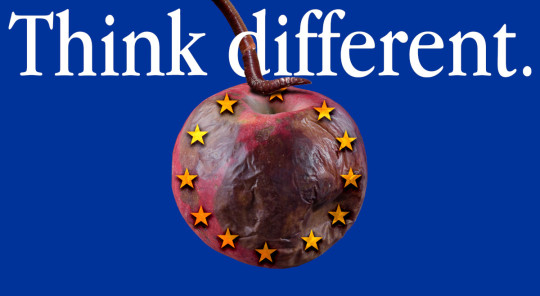
If you'd like an essay-formatted version of this post to read or share, here's a link to it on pluralistic.net, my surveillance-free, ad-free, tracker-free blog:
https://pluralistic.net/2024/02/06/spoil-the-bunch/#dma

There's a strain of anti-anti-monopolist that insists that they're not pro-monopoly – they're just realists who understand that global gigacorporations are too big to fail, too big to jail, and that governments can't hope to rein them in. Trying to regulate a tech giant, they say, is like trying to regulate the weather.
This ploy is cousins with Jay Rosen's idea of "savvying," defined as: "dismissing valid questions with the insider's, 'and this surprises you?'"
https://twitter.com/jayrosen_nyu/status/344825874362810369?lang=en
In both cases, an apologist for corruption masquerades as a pragmatist who understands the ways of the world, unlike you, a pathetic dreamer who foolishly hopes for a better world. In both cases, the apologist provides cover for corruption, painting it as an inevitability, not a choice. "Don't hate the player. Hate the game."
The reason this foolish nonsense flies is that we are living in an age of rampant corruption and utter impunity. Companies really do get away with both literal and figurative murder. Governments really do ignore horrible crimes by the rich and powerful, and fumble what rare, few enforcement efforts they assay.
Take the GDPR, Europe's landmark privacy law. The GDPR establishes strict limitations of data-collection and processing, and provides for brutal penalties for companies that violate its rules. The immediate impact of the GDPR was a mass-extinction event for Europe's data-brokerages and surveillance advertising companies, all of which were in obvious violation of the GDPR's rules.
But there was a curious pattern to GDPR enforcement: while smaller, EU-based companies were swiftly shuttered by its provisions, the US-based giants that conduct the most brazen, wide-ranging, illegal surveillance escaped unscathed for years and years, continuing to spy on Europeans.
One (erroneous) way to look at this is as a "compliance moat" story. In that story, GDPR requires a bunch of expensive systems that only gigantic companies like Facebook and Google can afford. These compliance costs are a "capital moat" – a way to exclude smaller companies from functioning in the market. Thus, the GDPR acted as an anticompetitive wrecking ball, clearing the field for the largest companies, who get to operate without having to contend with smaller companies nipping at their heels:
https://www.techdirt.com/2019/06/27/another-report-shows-gdpr-benefited-google-facebook-hurt-everyone-else/
This is wrong.
Oh, compliance moats are definitely real – think of the calls for AI companies to license their training data. AI companies can easily do this – they'll just buy training data from giant media companies – the very same companies that hope to use models to replace creative workers with algorithms. Create a new copyright over training data won't eliminate AI – it'll just confine AI to the largest, best capitalized companies, who will gladly provide tools to corporations hoping to fire their workforces:
https://pluralistic.net/2023/02/09/ai-monkeys-paw/#bullied-schoolkids
But just because some regulations can be compliance moats, that doesn't mean that all regulations are compliance moats. And just because some regulations are vigorously applied to small companies while leaving larger firms unscathed, it doesn't follow that the regulation in question is a compliance moat.
A harder look at what happened with the GDPR reveals a completely different dynamic at work. The reason the GDPR vaporized small surveillance companies and left the big companies untouched had nothing to do with compliance costs. The Big Tech companies don't comply with the GDPR – they just get away with violating the GDPR.
How do they get away with it? They fly Irish flags of convenience. Decades ago, Ireland started dabbling with offering tax-havens to the wealthy and mobile – they invented the duty-free store:
https://en.wikipedia.org/wiki/Duty-free_shop#1947%E2%80%931990:_duty_free_establishment
Capturing pennies from the wealthy by helping them avoid fortunes they owed in taxes elsewhere was terribly seductive. In the years that followed, Ireland began aggressively courting the wealthy on an industrial scale, offering corporations the chance to duck their obligations to their host countries by flying an Irish flag of convenience.
There are other countries who've tried this gambit – the "treasure islands" of the Caribbean, the English channel, and elsewhere – but Ireland is part of the EU. In the global competition to help the rich to get richer, Ireland had a killer advantage: access to the EU, the common market, and 500m affluent potential customers. The Caymans can hide your money for you, and there's a few super-luxe stores and art-galleries in George Town where you can spend it, but it's no Champs Elysees or Ku-Damm.
But when you're competing with other countries for the pennies of trillion-dollar tax-dodgers, any wins can be turned into a loss in an instant. After all, any corporation that is footloose enough to establish a Potemkin Headquarters in Dublin and fly the trídhathach can easily up sticks and open another Big Store HQ in some other haven that offers it a sweeter deal.
This has created a global race to the bottom among tax-havens to also serve as regulatory havens – and there's a made-in-the-EU version that sees Ireland, Malta, Cyprus and sometimes the Netherlands competing to see who can offer the most impunity for the worst crimes to the most awful corporations in the world.
And that's why Google and Facebook haven't been extinguished by the GDPR while their rivals were. It's not compliance moats – it's impunity. Once a corporation attains a certain scale, it has the excess capital to spend on phony relocations that let it hop from jurisdiction to jurisdiction, chasing the loosest slots on the strip. Ireland is a made town, where the cops are all on the take, and two thirds of the data commissioner's rulings are eventually overturned by the federal court:
https://www.iccl.ie/digital-data/iccl-2023-gdpr-report/
This is a problem among many federations, not just the EU. The US has its onshore-offshore tax- and regulation-havens (Delaware, South Dakota, Texas, etc), and so does Canada (Alberta), and some Swiss cantons are, frankly, batshit:
https://lenews.ch/2017/11/25/swiss-fact-some-swiss-women-had-to-wait-until-1991-to-vote/
None of this is to condemn federations outright. Federations are (potentially) good! But federalism has a vulnerability: the autonomy of the federated states means that they can be played against each other by national or transnational entities, like corporations. This doesn't mean that it's impossible to regulate powerful entities within a federation – but it means that federal regulation needs to account for the risk of jurisdiction-shopping.
Enter the Digital Markets Act, a new Big Tech specific law that, among other things, bans monopoly app stores and payment processing, through which companies like Apple and Google have levied a 30% tax on the entire app market, while arrogating to themselves the right to decide which software their customers may run on their own devices:
https://pluralistic.net/2023/06/07/curatorial-vig/#app-tax
Apple has responded to this regulation with a gesture of contempt so naked and broad that it beggars belief. As Proton describes, Apple's DMA plan is the very definition of malicious compliance:
https://proton.me/blog/apple-dma-compliance-plan-trap
Recall that the DMA is intended to curtail monopoly software distribution through app stores and mobile platforms' insistence on using their payment processors, whose fees are sky-high. The law is intended to extinguish developer agreements that ban software creators from informing customers that they can get a better deal by initiating payments elsewhere, or by getting a service through the web instead of via an app.
In response, Apple, has instituted a junk fee it calls the "Core Technology Fee": EUR0.50/install for every installation over 1m. As Proton writes, as apps grow more popular, using third-party payment systems will grow less attractive. Apple has offered discounts on its eye-watering payment processing fees to a mere 20% for the first payment and 13% for renewals. Compare this with the normal – and far, far too high – payment processing fees the rest of the industry charges, which run 2-5%. On top of all this, Apple has lied about these new discounted rates, hiding a 3% "processing" fee in its headline figures.
As Proton explains, paying 17% fees and EUR0.50 for each subscriber's renewal makes most software businesses into money-losers. The only way to keep them afloat is to use Apple's old, default payment system. That choice is made more attractive by Apple's inclusion of a "scare screen" that warns you that demons will rend your soul for all eternity if you try to use an alternative payment scheme.
Apple defends this scare screen by saying that it will protect users from the intrinsic unreliability of third-party processors, but as Proton points out, there are plenty of giant corporations who get to use their own payment processors with their iOS apps, because Apple decided they were too big to fuck with. Somehow, Apple can let its customers spend money Uber, McDonald's, Airbnb, Doordash and Amazon without terrorizing them about existential security risks – but not mom-and-pop software vendors or publishers who don't want to hand 30% of their income over to a three-trillion-dollar company.
Apple has also reserved the right to cancel any alternative app store and nuke it from Apple customers' devices without warning, reason or liability. Those app stores also have to post a one-million euro line of credit in order to be considered for iOS. Given these terms, it's obvious that no one is going to offer a third-party app store for iOS and if they did, no one would list their apps in it.
The fuckery goes on and on. If an app developer opts into third-party payments, they can't use Apple's payment processing too – so any users who are scared off by the scare screen have no way to pay the app's creators. And once an app creator opts into third party payments, they can never go back – the decision is permanent.
Apple also reserves the right to change all of these policies later, for the worse ("I am altering the deal. Pray I don't alter it further" -D. Vader). They have warned developers that they might change the API for reporting external sales and revoke developers' right to use alternative app stores at its discretion, with no penalties if that screws the developer.
Apple's contempt extends beyond app marketplaces. The DMA also obliges Apple to open its platform to third party browsers and browser engines. Every browser on iOS is actually just Safari wrapped in a cosmetic skin, because Apple bans third-party browser-engines:
https://pluralistic.net/2022/12/13/kitbashed/#app-store-tax
But, as Mozilla puts it, Apple's plan for this is "as painful as possible":
https://www.theverge.com/2024/1/26/24052067/mozilla-apple-ios-browser-rules-firefox
For one thing, Apple will only allow European customers to run alternative browser engines. That means that Firefox will have to "build and maintain two separate browser implementations — a burden Apple themselves will not have to bear."
(One wonders how Apple will treat Americans living in the EU, whose Apple accounts still have US billing addresses – these people will still be entitled to the browser choice that Apple is grudgingly extending to Europeans.)
All of this sends a strong signal that Apple is planning to run the same playbook with the DMA that Google and Facebook used on the GDPR: ignore the law, use lawyerly bullshit to chaff regulators, and hope that European federalism has sufficiently deep cracks that it can hide in them when the enforcers come to call.
But Apple is about to get a nasty shock. For one thing, the DMA allows wronged parties to start their search for justice in the European federal court system – bypassing the Irish regulators and courts. For another, there is a global movement to check corporate power, and because the tech companies do the same kinds of fuckery in every territory, regulators are able to collaborate across borders to take them down.
Take Apple's app store monopoly. The best reference on this is the report published by the UK Competition and Markets Authority's Digital Markets Unit:
https://assets.publishing.service.gov.uk/media/63f61bc0d3bf7f62e8c34a02/Mobile_Ecosystems_Final_Report_amended_2.pdf
The devastating case that the DMU report was key to crafting the DMA – but it also inspired a US law aimed at forcing app markets open:
https://www.congress.gov/bill/117th-congress/senate-bill/2710
And a Japanese enforcement action:
https://asia.nikkei.com/Business/Technology/Japan-to-crack-down-on-Apple-and-Google-app-store-monopolies
And action in South Korea:
https://www.reuters.com/technology/skorea-considers-505-mln-fine-against-google-apple-over-app-market-practices-2023-10-06/
These enforcers gather for annual meetings – I spoke at one in London, convened by the Competition and Markets Authority – where they compare notes, form coalitions, and plan strategy:
https://www.eventbrite.co.uk/e/cma-data-technology-and-analytics-conference-2022-registration-308678625077
This is where the savvying breaks down. Yes, Apple is big enough to run circles around Japan, or South Korea, or the UK. But when those countries join forces with the EU, the USA and other countries that are fed up to the eyeballs with Apple's bullshit, the company is in serious danger.
It's true that Apple has convinced a bunch of its customers that buying a phone from a multi-trillion-dollar corporation makes you a member of an oppressed religious minority:
https://pluralistic.net/2024/01/12/youre-holding-it-wrong/#if-dishwashers-were-iphones
Some of those self-avowed members of the "Cult of Mac" are willing to take the company's pronouncements at face value and will dutifully repeat Apple's claims to be "protecting" its customers. But even that credulity has its breaking point – Apple can only poison the well so many times before people stop drinking from it. Remember when the company announced a miraculous reversal to its war on right to repair, later revealed to be a bald-faced lie?
https://pluralistic.net/2023/09/22/vin-locking/#thought-differently
Or when Apple claimed to be protecting phone users' privacy, which was also a lie?
https://pluralistic.net/2022/11/14/luxury-surveillance/#liar-liar
The savvy will see Apple lying (again) and say, "this surprises you?" No, it doesn't surprise me, but it pisses me off – and I'm not the only one, and Apple's insulting lies are getting less effective by the day.

Image:
Alex Popovkin, Bahia, Brazil from Brazil (modified)
https://commons.wikimedia.org/wiki/File:Annelid_worm,_Atlantic_forest,_northern_littoral_of_Bahia,_Brazil_%2816107326533%29.jpg
CC BY 2.0
https://creativecommons.org/licenses/by/2.0/deed.en
--
Hubertl (modified)
https://commons.wikimedia.org/wiki/File:2015-03-04_Elstar_%28apple%29_starting_putrefying_IMG_9761_bis_9772.jpg
CC BY-SA 4.0
https://creativecommons.org/licenses/by-sa/4.0/deed.en
#pluralistic#apple#malicious compliance#dma#digital markets act#eu#european union#federalism#corporatism#monopolies#trustbusting#regulation#protonmail#junk fees#cult of mac#interoperability#browser wars#firefox#mozilla#webkit#browser engines
593 notes
·
View notes
Text
After re-re-reading the murderbot series so many times I’ve lost count, it hit me that MURDERBOT WAS OWNED BY AN INSURANCE COMPANY. They write BONDS. Everything else is just “vertical integration” — the security, the equipment, the data mining. Insurance has always been data mining adjacent; it’s called actuarial science. And if you don’t think your for-profit insurance company would sell your data for a fast buck ��
318 notes
·
View notes
Text

#politics#us politics#progressive#capitalism#environment#environmentalism#green#earth#activism#corporatism#mother earth#pollution#quoteoftheday#quotes#winona laduke
178 notes
·
View notes
Text
What's not spoken about nearly enough is how the combination of growing up poor and capitalism/corporate culture for the working class condition people.
I lived below the poverty line my entire life. My mother mostly worked in restaurants, my dad cycled through jobs and nobody really knew where his money went.
I failed my way through high school, got my first job at Olive Garden where I had a manager deal with anxiety by screaming during peak and frequently correcting me and other female workers for not having more "open and welcoming" body language.
I worked at a few other restaurants serving or being a host. Then I worked for Starbucks.
I went through community college, then undergrad, then grad school. I became homeless part way through grad school but pulled it off. I was the first on my mom's side of the family to go to college. It did take $80,000 in student loans.
I am now at a point where I qualify for jobs that make an average of $60,000 to $80,000 or more.
It doesn't feel "right" that I qualify to make that much. It feels like reality itself does not make sense. The universe has made a mistake. There is incredible anxiety around no longer working in working class jobs and being in that culture.
There is a certain type of sociality and culture that comes with being raised in certain income brackets. It feels as though I quite literally do not speak the same language as people who make $30,000 a year, let alone $60,000 - $80,000. Think about a group of people or subculture that exists in society that you don't ever really spend much time around and feel like an outsider to, but suddenly you're in a situation where you're surrounded by only those people and you're trying your hardest to fit inside the "in group" - that is the experience.
Both growing up in poverty and the corporate workplace culture for the working class breeds feelings of inadequacy and a sense of belonging and community with being poor and associating with other poor people. The more someone makes, the less they will find people who grew up poor and have that socialization - the more likely they will surround themselves with people who were raised in wealth and had connections. The more they will feel they don't belong.
#tangent#corporations#poverty#corporatism#college#student#capitalism#wealth#working class#class struggle#class
384 notes
·
View notes
Text
I GOT IT
They privatized and corporatized community. They corporatized human rights. And people swallowed that like candy.
And combined with individualism saying "you owe nobody, least of all some unaccredited movement, anything"...
No, hear me out because when we say protest or strike or whatever else what's the FIRST thing people ask?
"who organized this?"
Y'all refuse to listen to normal people anymore. And yeah organizations are great and they offer awesome resources and support behind their actions but the more I think about it the more it just sounds like another psyop used to discredit and further marginalize the already marginalized.
Those organizations weren't always there and we were organizing WAY more effectively before them.
And now we're peaking on a fascist wave and where are they calling for strikes and unity and protests? For solidarity?
....but the small grassroots groups that only have a cashapp to raise funds are. The ones actually on the ground or at desks making posters are. The people suffering from poverty and systematic racism are.
But it's them you need to be weary of? Normal people unallied to a corporation & willing to fight the ones ruining our lives?
They might not be trustworthy, huh? Might take advantage of you?
*taps the sign aggressively*

#community#mutual aid#protest#direct action#strike#lgbt#capitalism#corporatism#individualism#community outreach#whiteness#queer#trans#gay#lesbian#bisexual#transgender#biden#current events#trust each other#we protect us#we always have#solidarity#BIPOC#organize#allies#native american#take action#intersectionality#classism
281 notes
·
View notes
Text
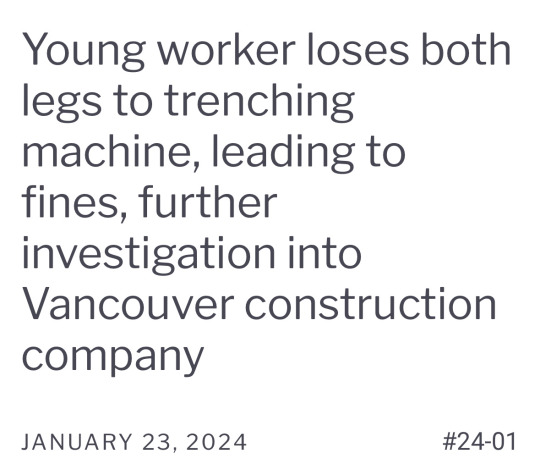
Source

Source

*Taps sign repeatedly*
#capitalism#corporatism#end capitalism#child labor#us politics#politics#government#the left#progressive#labor#working class#current events#news
5K notes
·
View notes
Text
"Isn't capitalism so awful please buy my full priced bugged out game so you can be lectured about the evils of capitalism and be sure to visit our merch store to support smashing capitalism"
The fucking state of the industry right now
#hypocrisy#leftists are demons#envy is an ugly thing#ubisoft#skull and bones#mail time#gaming#corporatism
31 notes
·
View notes
Text
Don't forget to adhere to the emotional dress code at work today! Negative or non-approved emotions are bad for business and should not be worn while on the clock!
Also remember, under socialism there is no individuality or freedom of expression! It is capitalism and the free market that gives us that!
~Sincerely, Corporate!
#capitalism#corporate america#corporatism#emotional labor#socialism#socialist#my stuff#my post#anti capitalism
115 notes
·
View notes
Text
Naomi Klein's "Doppelganger"
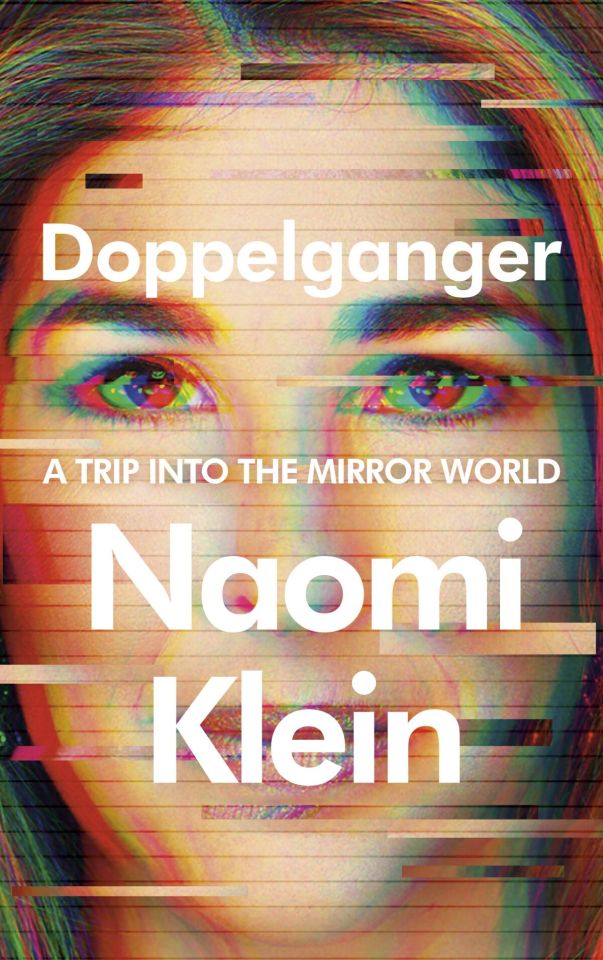
Tomorrow (September 6) at 7pm, I'll be hosting Naomi Klein at the LA Public Library for the launch of Doppelganger.
On September 12 at 7pm, I'll be at Toronto's Another Story Bookshop with my new book The Internet Con: How to Seize the Means of Computation.

If the Naomi be Klein
you’re doing just fine
If the Naomi be Wolf
Oh, buddy. Ooooof.
I learned this rhyme in Doppelganger, Naomi Klein's indescribable semi-memoir that is (more or less) about the way that people confuse her with Naomi Wolf, and how that fact has taken on a new urgency as Wolf descended into conspiratorial politics, becoming a far-right darling and frequent Steve Bannon guest:
https://us.macmillan.com/books/9780374610326/doppelganger
This is a very odd book. It is also a very, very good book. The premise – exploring the two Naomis' divergence – is a surprisingly sturdy scaffold for an ambitious, wide-ranging exploration of this very frightening moment of polycrisis and systemic failure:
https://www.youtube.com/watch?v=lCjcwVhFhTA
Wolf once had a cluster of superficial political and personal similarities to Klein: a feminist author of real literary ability, a Jewish woman, and, of course, a Naomi. Klein grew accustomed to being mistaken for Wolf, but never fully comfortable. Wolf's politics were always more Sheryl Sandberg than bell hooks (or Emma Goldman). While Klein talked about capitalism and class and solidarity, Wolf wanted to "empower" individual women to thrive in a market system that would always produce millions of losers for every winner.
Fundamentally: Klein is a leftist, Wolf was a liberal. The classic leftist distinction goes: leftists want to abolish a system where 150 white men run the world; liberals want to replace half of those 150 with women, queers and people of color.
The past forty years have seen the rise and rise of a right wing politics that started out extreme (think of Reagan and Thatcher's support for Pinochet's death-squads) and only got worse. Liberals and leftists forged an uneasy alliance, with liberals in the lead (literally, in Canada, where today, Justin Trudeau's Liberal Party governs in partnership with the nominally left NDP).
But whenever real leftist transformation was possible, liberals threw in with conservatives: think of the smearing and defenestration of Corbyn by Labour's right, or of the LibDems coalition with David Cameron's Tories, or of the Democrats' dirty tricks to keep Bernie from appearing on the national ballot.
Lacking any kind of transformational agenda, the liberal answer to capitalism's problems always comes down to minor tweaks ("making sure half of our rulers are women, queers and people of color") rather than meaningful, structural shifts. This leaves liberals in the increasingly absurd position of defending the indefensible: insisting that the FDA shouldn't be questioned despite its ghastly failures during the opioid epidemic; claiming that the voting machine companies whose defective products have been the source of increasingly urgent technical criticism are without flaw; embracing the "intelligence community" as the guardians of the best version of America; cheerleading for deindustrialization while telling the workers it harmed with "learn to code"; demanding more intervention in speech by our monopolistic tech companies; and so on.
It's not like leftists ever stopped talking about the importance of transformation and not just reform. But as the junior partners in the progressive coalition, leftists have been drowned out by liberal reformers. In most of the world, if you are worried about falling wages, corporate capture of government, and scientific failures due to weak regulators, the "progressive" answer was to tell you it was all in your head, that you were an unhinged conspiratorialist:
https://doctorow.medium.com/the-swivel-eyed-loons-have-a-point-3434d7cbfae2
For Klein, it's this failure that the faux-populist right has exploited, redirecting legitimate anger and fear into racist, xenophobic, homophobic, sexist and transphobic rage. The deep-pocketed backers of the conservative movement didn't just find a method to get turkeys to vote for Christmas – progressives created the conditions that made that method possible.
If progressives answer pregnant peoples' concerns about vaccine risks – concerns rooted in the absolute failure of prenatal care – with dismissals, while conservatives accept those concerns and funnel them into conspiratorialism, then progressives' message becomes, "We are the movement of keeping things as they are," while conservatives become the movement of "things have to change." Think here of the 2016 liberal slogan, "America was already great," as an answer to the faux-populist rallying cry, "Make America great again."
When liberals get to define what it means to be "progressive," the fundamental, systemic critique is swept away. Conservatives – conservatives! – get to claim the revolutionary mantle, to insist that they alone are interested in root-and-branch transformation of society.
Like the two Naomis, conservatives and progressives become warped mirrors of one another. The progressive campaign for bodily autonomy is co-opted to be the foundation of the anti-vax movement. This is the mirror world, where concerns about real children – in border detention, or living in poverty in America – are reflected back as warped fever-swamp hallucinations about kids in imaginary pizza restaurant basements and Hollywood blood sacrifice rituals. The mirror world replaces RBG with Amy Coney-Barrett and calls it a victory for women. The mirror world defends workers by stoking xenophobic fears about immigrants.
But progressives let it happen. Progressives cede anti-surveillance to conservatives, defending reverse warrants when they're used to enumerate Jan 6 insurrectionists (nevermind that these warrants are mostly used to round up BLM demonstrators). Progressives cede suspicion of large corporations to conservatives, defending giant, exploitative, monopolistic corporations so long as they arouse conservative ire with some performative DEI key-jingling. Progressives defend the CIA and FBI when they're wrongfooting Trump, and voting machine vendors when they're turned into props for the Big Lie.
These issues are transformed in the mirror world: from grave concerns about real things, into unhinged conspiracies about imaginary things. Urgent environmental concerns are turned into a pretense to ban offshore wind turbines ("to protect the birds"). Worry about gender equality is transformed into seminars about women's representation in US drone-killing squads.
For Klein, the transformation of Wolf from liberal icon – Democratic Party consultant and Lean-In-type feminist icon – to rifle-toting Trumpling with a regular spot on the Steve Bannon Power Hour is an entrypoint to understanding the mirror world. How did so many hippie-granola yoga types turn into vicious eugenicists whose answer to "wear a mask to protect the immunocompromised" is "they should die"?
The PastelQ phenomenon – the holistic medicine and "clean eating" to QAnon pipeline – recalls the Nazi obsession with physical fitness, outdoor activities and "natural" living. The neoliberal transformation of health from a collective endeavor – dependent on environmental regulation, sanitation, and public medicine – into a private one, built entirely on "personal choices," leads inexorably to eugenics.
Once you start looking for the mirror world, you see it everywhere. AI chatbots are mirrors of experts, only instead of giving you informed opinions, they plagiarize sentence-fragments into statistically plausible paragraphs. Brands are the mirror-world version of quality, a symbol that isn't a mark of reliability, but a mark of a mark, a sign pointing at nothing. Your own brand – something we're increasingly expected to have – is the mirror world image of you.
The mirror world's overwhelming motif is "I know you are, but what am I?" As in, "Oh, you're a socialist? Well, you know that 'Nazi' stands for 'National Socialist, right?" (and inevitably, this comes from someone who obsesses over the 'Great Replacement' and considers themself a 'race realist').
This isn't serious politics, but it is seriously important. "Antisemitism is the socialism of fools," its obsession with "international bankers" the mirror-world version of the real and present danger from big finance and private equity wreckers. And, as Klein discusses with great nuance and power, the antisemitism discussion is eroded from both sides: both by antisemites, and by doctrinaire Zionists who insist that any criticism of Israel is always and ever antisemetic.
As a Jew in solidarity with Palestinians, I found this section of the book especially good – thoughtful and vigorous, pulling no punches and still capturing the discomfort aroused by this deliberately poisoned debate.
This thoughtful, vigorous prose and argumentation deserves its own special callout here: Klein has produced a first-rate literary work just as much as this is a superb philosophical and political tome. In this moment where the mirror world is exploding and the real world is contracting, this is an essential read.
I'll be Klein's interlocutor tomorrow night (Sept 6) at the LA launch for Doppelganger. We'll be appearing at 7PM at the @LAPublicLibrary:
https://lafl.org/ALOUD
Livestreaming at:
https://youtube.com/live/jIoAh-jxb2k

If you'd like an essay-formatted version of this post to read or share, here's a link to it on pluralistic.net, my surveillance-free, ad-free, tracker-free blog:
https://pluralistic.net/2023/09/05/not-that-naomi/#if-the-naomi-be-klein-youre-doing-just-fine


#naomi klein#naomi wolf#conspiratorialism#climate#shock doctrine#race#antisemitism#gender#feminism#books#reviews#no logo#corporatism#heel turns#realignment#power#leftism vs liberalism#gift guide#rabbit holes#memoir#israel#zionism#pluralistic
271 notes
·
View notes
Text
To move beyond denial requires not only an acknowledgment that slaveholders practiced a kind of scientific management but also a broader rethinking of deep-seated assumptions about the relationship between capitalism and control.
Though there are many exceptions, histories of business practices—at least those that reach a general audience—tend to be both individual and social success stories. They tell stories that are win-win, with businesspeople earning profits and customers, laborers, and communities benefiting along the way. This can, of course, be true.
The shift from seeing trade as zero-sum to positive-sum was one of the most important transitions underpinning the rise of capitalism.
173 notes
·
View notes
Text
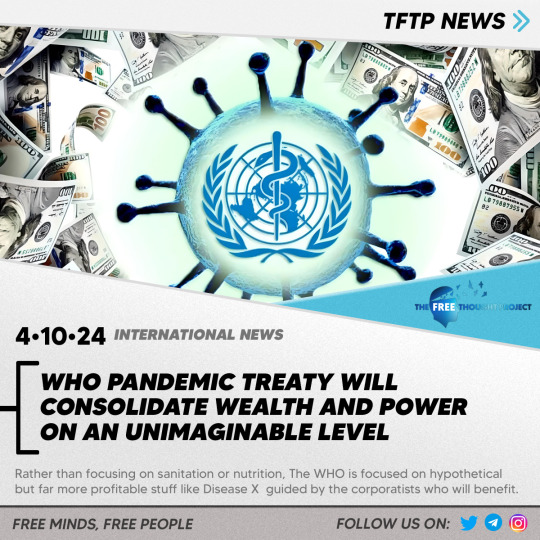
That is how profiteering works. So we will have to make things right with activism and exposure because they obviously won’t.
Read More: https://thefreethoughtproject.com/international-news/who-pandemic-treaty-will-consolidate-wealth-and-power-on-an-unimaginable-level
#TheFreeThoughtProject #TFTP
22 notes
·
View notes
Text

38 notes
·
View notes
Text
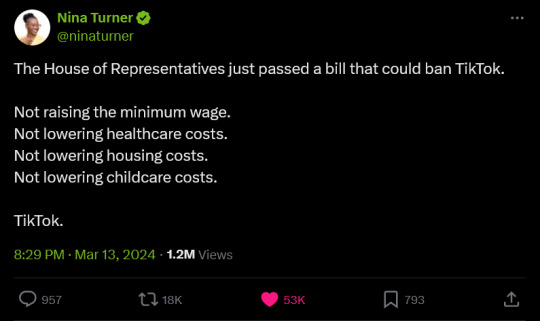
#tweet#communism#anti capitalism#socialism#leftism#anarchy#best of tweets#send tweet#minimum wage#classism#xitter#economics#corporatism#capitalism#wage slavery#housing costs#tiktok#vine#tik toks#social media
15 notes
·
View notes
Text
“A mistake repeated more than once is a decision.”
No work motivational quip this is not correct and this is why I’m cynical about the workplace. A mistake repeated more than once is a mistake. How about let’s look at why a mistake is repeated instead of declaring that it’s deliberate. This is probably the worst statement I’ve seen in a while.
9 notes
·
View notes